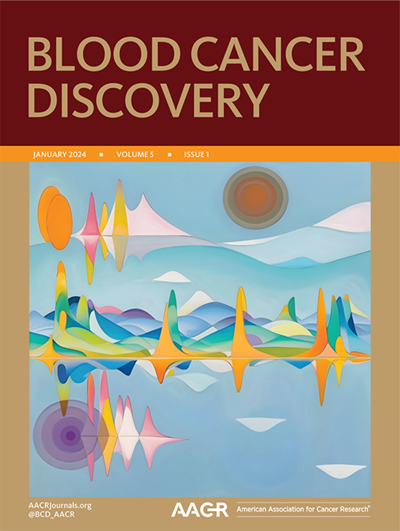Abstract A46: Heterozygous mutations in DDX41 cause erythroid progenitor cell defects and cooperate with p53 mutations to cause hematologic malignancy
IF 11.5
Q1 HEMATOLOGY
引用次数: 0
Abstract
Germline mutations in the RNA Helicase gene DDX41 are the most common cause of inherited susceptibility to adult MDS and AML. These mutations are always heterozygous and are typically frameshifts, causing loss of functional protein. We recently reported that at least one functional copy of DDX41 is essential for hematopoiesis, and that DDX41 is required for ribosome biogenesis (Chlon et al., Cell Stem Cell 2021). While biallelic DDX41 mutations cause dramatic defects in hematopoiesis, the role of heterozygous mutations in MDS pathogenesis is not yet understood. DDX41 mutation carriers frequently experience idiopathic cytopenias of unknown significance (ICUS) prior to MDS onset, suggesting that underlying hematopoietic defects contribute to MDS/AML (Choi et al., Haemotologica 2021). The majority of DDX41-mutant MDS patients have refractory anemia, indicating that the erythroid lineage is particularly affected in these patients (Sebert et al., Blood 2019). Since ribosome defects are a common cause of inherited anemias and also contribute to MDS pathogenesis, we characterized the effect of heterozygous DDX41 mutations on erythropoiesis in murine and human models. Mice that were transplanted with Ddx41+/− bone marrow develop anemia at 12-15 months post-transplant. At younger ages, these mice have normal hematopoietic indices, but when stress erythropoiesis is induced by Pheylhydrazine-treatment, the Ddx41+/− mice have prolonged anemia. These observations indicate that heterozygous loss of DDX41 causes defects in erythropoiesis during stress and aging. We further characterized the effect of Ddx41-hetrozyogisty on erythroid progenitor function in vitro. In colony assays, we found that Ddx41+/− HSPC form fewer BFU-E but comparable numbers of myeloid colonies. In liquid culture erythroid differentiation cultures, we found that Ddx41+/− HSPC produce fewer CD71+ Ter119+ progenitors than controls. Mechanistically, we found that in vitro-derived erythroid progenitors from both mice and cell line models had decreased protein translation, suggesting that ribosome defects underlie the observed inefficiency in erythropoiesis. In congenital ribosomopathy diseases, ribosome defects lead to p53 activation which contributes to defects in erythropoiesis. Interestingly, TP53 mutations are common in DDX41-mutant MDS/AML (Sebert et al., Blood 2019), suggesting that the ribosome deficiency selects for these mutations. To assess the role of p53 mutations in the development of DDX41-mutant MDS, we generated Ddx41+/−;p53+/− mice and transplanted the bone marrow into lethally-irradiated recipients and followed the mice for 1 year. These mice developed a lethal MDS-like phenotype at 7-12 months post-transplant while control mice lived until the end of the study period. The sick mice had anemia and other cytopenias accompanied by enlarged spleens and dysplastic myeloid cells. Collectively, these results indicate that p53 mutations cooperate with Ddx41-heterozygosity to promote hematologic malignancy. Citation Format: Timothy M Chlon, Emily Stepanchick, Analise Sulentic, Andrew Wilson, Daniel T Starczynowski. Heterozygous mutations in DDX41 cause erythroid progenitor cell defects and cooperate with p53 mutations to cause hematologic malignancy [abstract]. In: Proceedings of the AACR Special Conference: Acute Myeloid Leukemia and Myelodysplastic Syndrome; 2023 Jan 23-25; Austin, TX. Philadelphia (PA): AACR; Blood Cancer Discov 2023;4(3_Suppl):Abstract nr A46.摘要A46:DDX41的杂合突变导致红系祖细胞缺陷,并与p53突变协同导致血液系统恶性肿瘤
RNA螺旋酶基因DDX41的种系突变是成人MDS和AML遗传易感性的最常见原因。这些突变总是杂合的,通常是移码的,导致功能蛋白的损失。我们最近报道,DDX41的至少一个功能拷贝对造血至关重要,并且DDX41是核糖体生物发生所必需的(Chlon等人,Cell Stem Cell 2021)。虽然双等位基因DDX41突变会导致造血功能的显著缺陷,但杂合突变在MDS发病机制中的作用尚不清楚。DDX41突变携带者在MDS发病前经常经历意义不明的特发性细胞减少症(ICUS),这表明潜在的造血缺陷导致MDS/AML(Choi等人,Haemotologica 2021)。大多数DDX41突变MDS患者患有难治性贫血,这表明这些患者的红系谱系尤其受到影响(Sebert等人,Blood 2019)。由于核糖体缺陷是遗传性贫血的常见原因,也有助于MDS的发病机制,我们在小鼠和人类模型中表征了杂合DDX41突变对红细胞生成的影响。用Ddx41+/−骨髓移植的小鼠在移植后12-15个月出现贫血。在较年轻的时候,这些小鼠的造血指数正常,但当苯肼治疗诱导应激性红细胞生成时,Ddx41+/−小鼠会出现长期贫血。这些观察结果表明,DDX41的杂合缺失会导致应激和衰老过程中红细胞生成的缺陷。我们进一步表征了Ddx41杂合性对体外红系祖细胞功能的影响。在菌落测定中,我们发现Ddx41+/−HSPC形成的BFU-E较少,但髓系菌落数量相当。在液体培养红系分化培养中,我们发现Ddx41+/−HSPC产生的CD71+Ter119+祖细胞比对照组少。从机制上讲,我们发现来自小鼠和细胞系模型的体外衍生红系祖细胞的蛋白质翻译减少,这表明核糖体缺陷是观察到的红细胞生成效率低下的原因。在先天性核糖体疾病中,核糖体缺陷会导致p53活化,从而导致红细胞生成缺陷。有趣的是,TP53突变在DDX41突变型MDS/AML中很常见(Sebert et al.,Blood 2019),这表明核糖体缺乏选择了这些突变。为了评估p53突变在DDX41突变MDS发展中的作用,我们产生了DDX41+/−;p53+/-小鼠,并将骨髓移植到致命辐射的受体中,并对小鼠进行1年的随访。这些小鼠在移植后7-12个月时出现了致命的MDS样表型,而对照小鼠则一直存活到研究期结束。患病小鼠出现贫血和其他细胞减少,伴有脾脏肿大和骨髓细胞发育异常。总之,这些结果表明p53突变与Ddx41杂合性协同作用,促进血液系统恶性肿瘤。引文格式:Timothy M Chlon,Emily Stepanchick,Analise Sulentic,Andrew Wilson,Daniel T Starczynowski。DDX41的杂合突变导致红系祖细胞缺陷,并与p53突变协同导致血液系统恶性肿瘤[摘要]。载:AACR特别会议论文集:急性髓细胞白血病和骨髓增生异常综合征;2023年1月23日至25日;德克萨斯州奥斯汀。费城(PA):AACR;血液癌症Discov 2023;4(3_Suppl):摘要编号A46。
本文章由计算机程序翻译,如有差异,请以英文原文为准。
求助全文
约1分钟内获得全文
求助全文
来源期刊

Blood Cancer Discovery
Multiple-
CiteScore
12.70
自引率
1.80%
发文量
139
期刊介绍:
The journal Blood Cancer Discovery publishes high-quality Research Articles and Briefs that focus on major advances in basic, translational, and clinical research of leukemia, lymphoma, myeloma, and associated diseases. The topics covered include molecular and cellular features of pathogenesis, therapy response and relapse, transcriptional circuits, stem cells, differentiation, microenvironment, metabolism, immunity, mutagenesis, and clonal evolution. These subjects are investigated in both animal disease models and high-dimensional clinical data landscapes.
The journal also welcomes submissions on new pharmacological, biological, and living cell therapies, as well as new diagnostic tools. They are interested in prognostic, diagnostic, and pharmacodynamic biomarkers, and computational and machine learning approaches to personalized medicine. The scope of submissions ranges from preclinical proof of concept to clinical trials and real-world evidence.
Blood Cancer Discovery serves as a forum for diverse ideas that shape future research directions in hematooncology. In addition to Research Articles and Briefs, the journal also publishes Reviews, Perspectives, and Commentaries on topics of broad interest in the field.
 求助内容:
求助内容: 应助结果提醒方式:
应助结果提醒方式:


